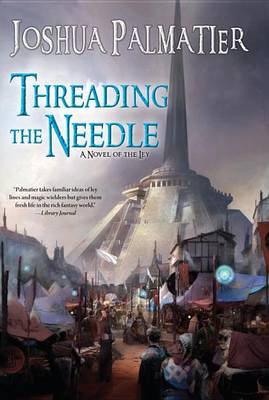
Danielle Ackley-McPhail
Written on May 17, 2016
Threading the Needle is the sequel to Shattering the Ley.
This epic fantasy novel by Joshua Palmatier is not a book to be selected lightly. It is well written and richly detailed, but at 498 pages just itself, it is a serious commitment, without taking into account it is a part of a series. If you like involved stories as intricate and rich as a woven tapestry, this is definitely the book for you. You will not be disappointed. It is full of action, danger, and intrigue, the interplay between characters and social groups understandable and interesting.
Threading the Needle is about survival after a catastrophic collapse of a complex magic system and the society that it sustained. You have groups just trying to survive, others grabbing at power previously out of their reach, and some, like Kara Tremain, who foresee that the danger from the magical collapse is not over and are looking for a way to correct the damage before the unstable mage energy—or ley—destroys all that the survivors have managed to rebuild and even the world itself. All of them are dealing with a scarcity of resources and unexpected changes in their reality…and sometimes their person…due to the magical fallout.
I must confess that I had not read Shattering the Ley before undertaking Threading the Needle. This made reading the book a little bit of a challenge, but not as much as you would think. For the most part the author did a great job adding refresher detail to this book that made up for any gaps in my knowledge due to not reading the previous one. There were only a few places toward the end where I found myself a little lost as the intense action did not allow for the type of exposition that would have made things more clear to me. This did not greatly impact my enjoyment of the book or my ability to follow the story.
To be truthful, there was very little I did not enjoy about this book. However, it did trigger a few of my pet-peeves.
The first one is the formatting of the text. It was sloppy and at times confusing, with bad breaks or no breaks where there should be. This is likely because what I received was an advance reader copy, or at least I hope it is, and is all on the publisher, not the author. For the most part this was just a minor annoyance and did not prevent me from enjoying the book.
The second one was a copyediting issue, little inconsistencies that pulled me from the story. The biggest of these was toward the end of the book, when the wrong character’s name was used in a pretty important scene. I was able to figure out what was going on, but this distraction was a little too visible and pulled me from the story at a critical point.
The final pet peeve, unfortunately, is my mother of all pet peeves and is likely the primary reason this book did not receive 5 stars from me. Names. Names are very, very important. They need to fit the universe you are creating and not interfere with the readers suspension of disbelieve. I have a real problem immersing myself in a book completely when names are discordant with my expectations. In a second-world epic fantasy I expect to see fantastic names…as in names I would not generally see if I picked up a phone book or a newspaper. Names that are not a usual part of my everyday world. This goes for both people and places. When I see names I do not expect to see in this fantasy realm—particularly if they are side by side with names that do look like they belong there—they create a disruption in the journey. For me, this is particularly amplified when everyday names appear intermingled with fantasy names. This might not seem a big deal. I mean, if the story is good enough you won’t even notice after a while, right? To some extent yes. But what this mingling of names does, for me at least, is set up expectations. When I see recognizable names in a fantasy setting the back of my mind starts looking for signs that this is the world I live in and when something is there in the description that echoes that potential my mind latches onto it and gets snagged, which means I’m not completely focused on the story being told. Did I enjoy the story? Most definitely, but at the same time I was always conscious of the names.
All in all, this was a fantastic book, in all regards of the word. The strength and skill of the storytelling kept me engaged and the concepts and details of the history were intriguing. Threading the Needle is well worth the investment of both time and resources.
